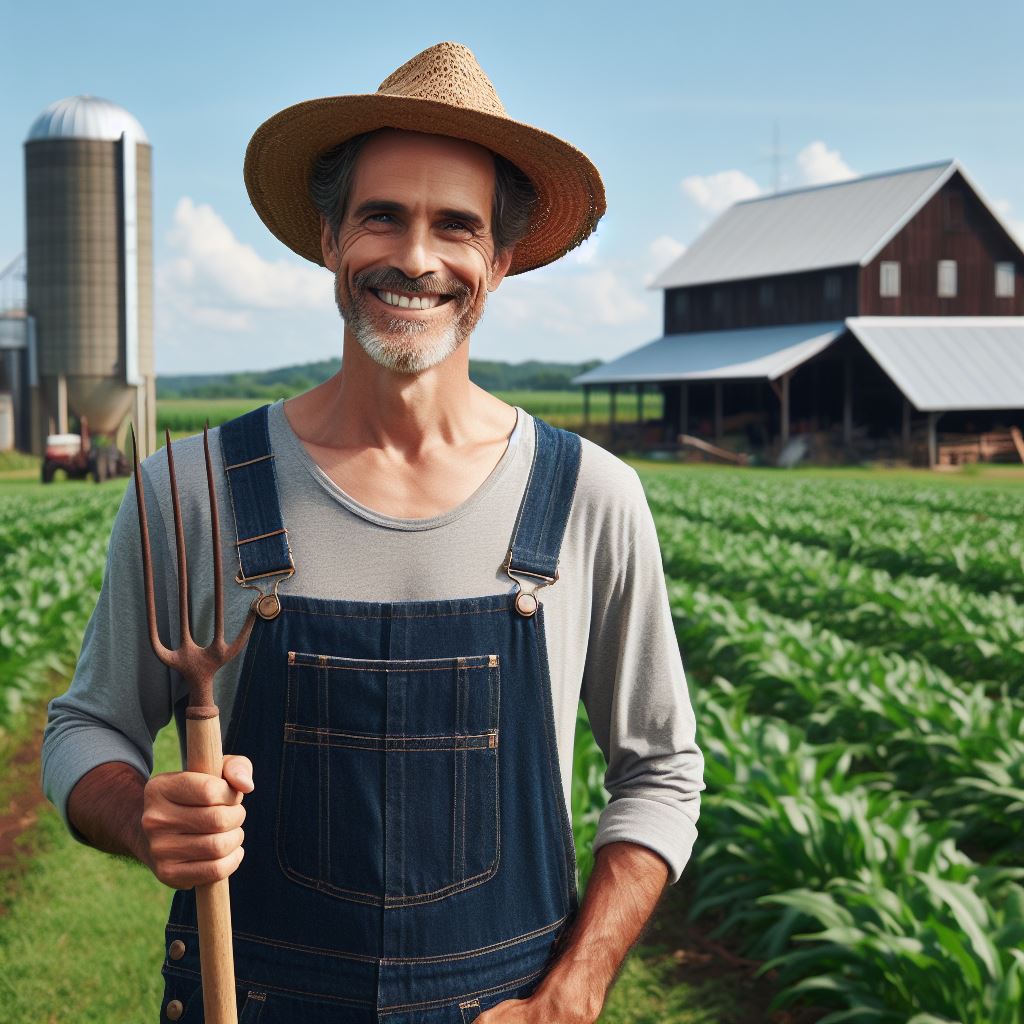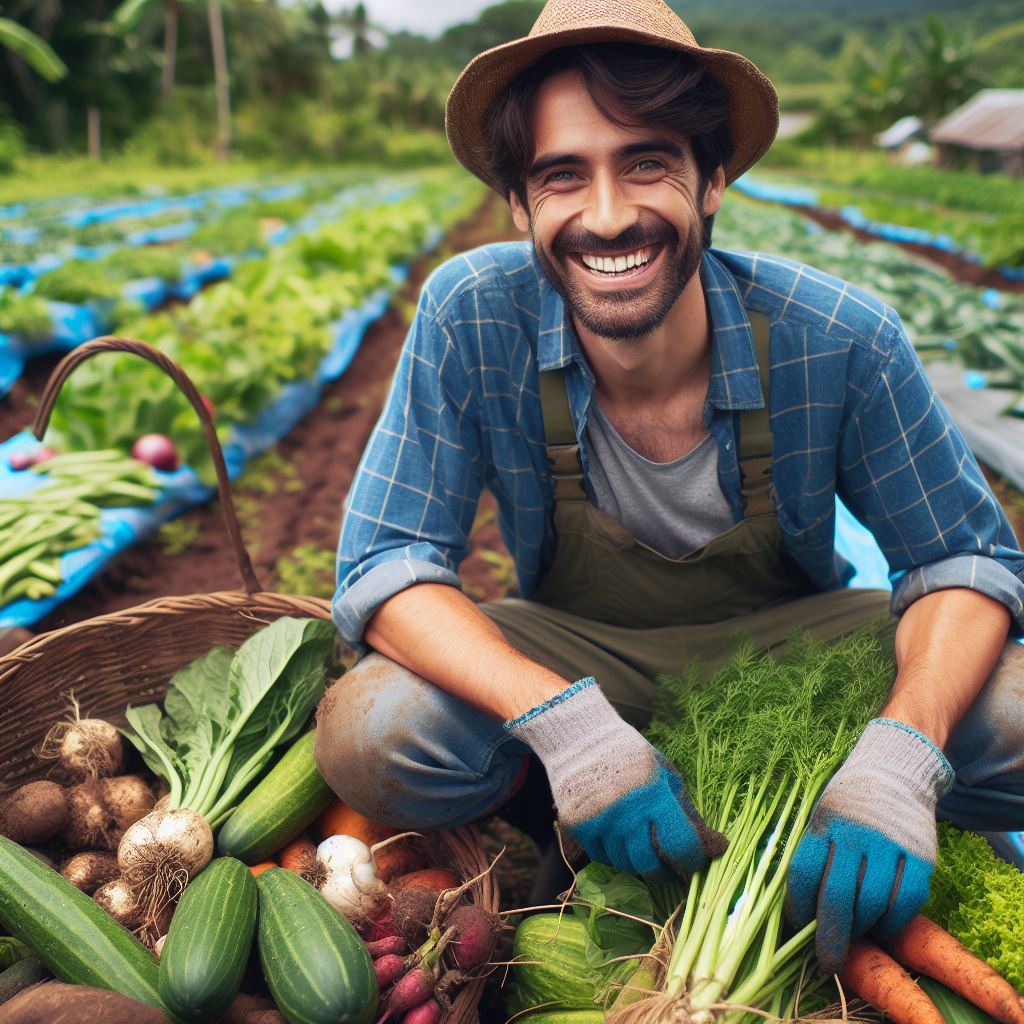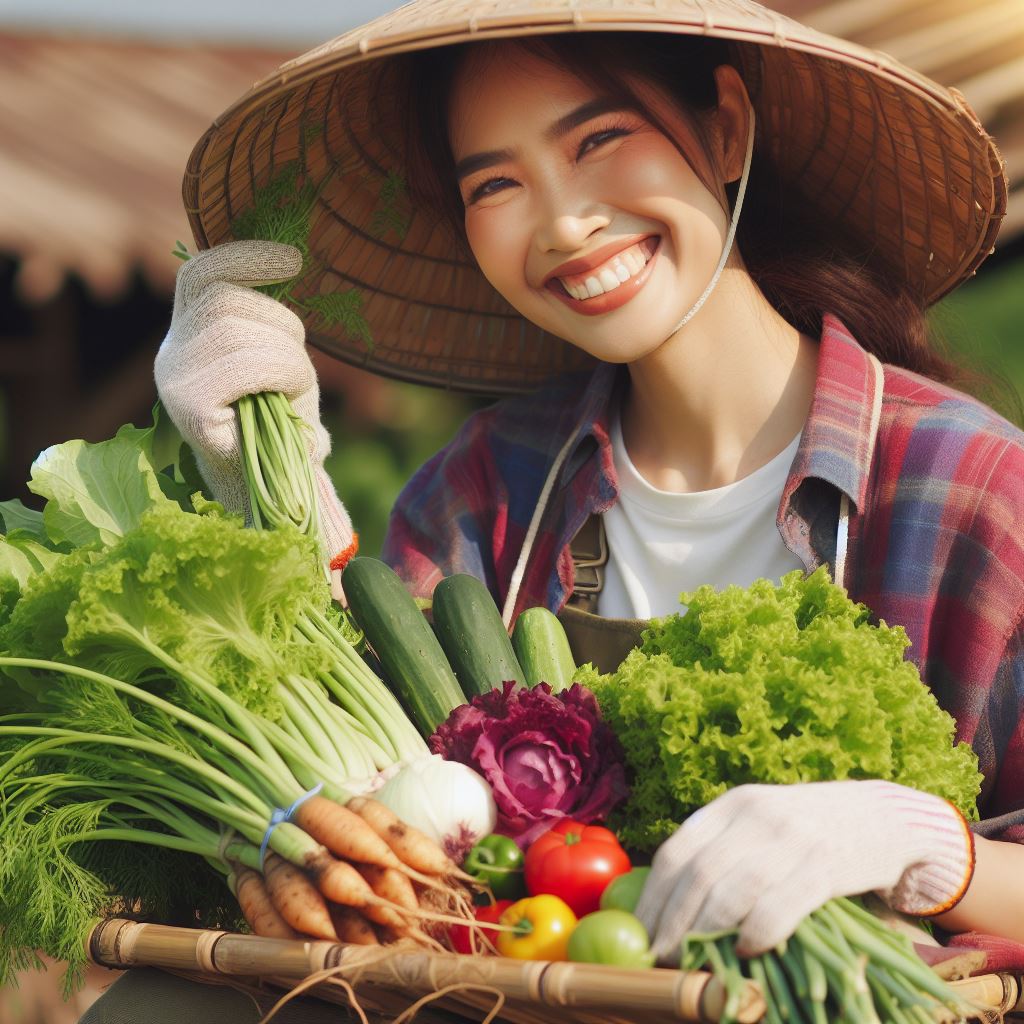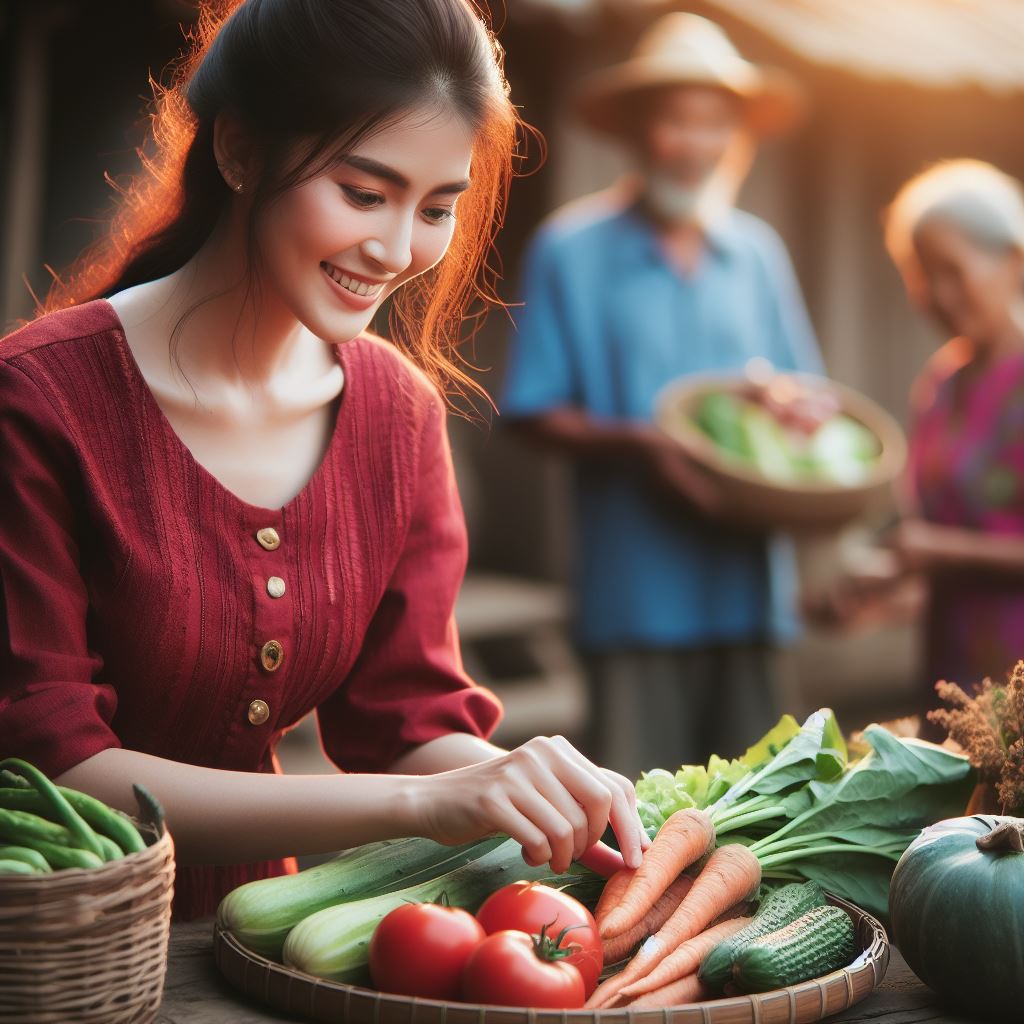Introduction
Meet Olivia, a visionary shaping the future of farming. She pioneers sustainable methods, redefining agriculture. In our changing world, farming’s role is evolving.
Olivia’s innovative approach signifies a transformative era. Sustainable practices intertwine with her mission, creating a ripple effect. As we delve into her journey, understand the profound impact.
Olivia’s vision extends beyond conventional boundaries, promising a sustainable agricultural landscape.
The significance of this evolution can’t be overstated. Join us on this exploration of Olivia’s pioneering efforts and the dynamic future of farming she envisions.
Embrace the transformative power of sustainable agriculture with Olivia leading the way.
Olivia’s Vision: Sustainable Farming
A. Olivia’s Emphasis on Sustainability in Farming Practices
Olivia strongly believes in the importance of sustainable farming practices for a thriving future.
She understands that sustainable farming not only benefits the environment but also ensures the long-term viability of agriculture.
By adopting practices that protect natural resources, Olivia aims to minimize the negative impact of farming on the ecosystem.
She strives to create a balance between agricultural productivity and environmental preservation.
Olivia focuses on implementing practices that conserve water, reduce soil erosion, and mitigate pollution.
These measures help in maintaining the ecological balance and contribute to the overall well-being of the planet.
B. Olivia’s Incorporation of Renewable Energy Sources on the Farm
- In her quest for sustainability, Olivia has successfully incorporated renewable energy sources on her farm.
- She understands the importance of transitioning from fossil fuels to renewable alternatives to combat climate change.
- Olivia harnesses the power of solar energy by installing solar panels on her farm.
- These panels generate electricity, which can be used to power various operations such as irrigation systems and machinery.
- Additionally, Olivia has also invested in wind turbines that efficiently convert wind energy into electricity.
- This renewable source of power further reduces the farm’s reliance on non-renewable resources and lowers its carbon footprint.
C. Her Use of Organic Farming Methods and Reduced Pesticide Use
- Olivia strongly believes in the benefits of organic farming and prioritizes its implementation on her farm.
- Organic farming methods focus on nurturing the soil and promoting biodiversity without the use of synthetic chemicals.
- She avoids the use of chemical fertilizers and pesticides, instead relying on composting and natural pest control methods.
- This approach not only reduces the negative impact on the environment but also produces healthier and more nutritious crops.
- By embracing organic farming practices, Olivia ensures that her farm is free from harmful residues and toxic chemicals.
- This not only benefits the consumers but also contributes to the well-being of farm workers and surrounding communities.
D. Olivia’s Focus on Soil Health and Promoting Biodiversity
Understanding the significance of soil health, Olivia emphasizes its preservation and enhancement.
She recognizes that healthy soil is the foundation of sustainable agriculture and vital for long-term productivity.
Olivia employs various techniques to improve soil health, such as minimizing soil disturbance, practicing crop rotation, and utilizing cover crops.
These practices help in maintaining soil structure, fertility, and the overall health of the ecosystem.
Transform Your Agribusiness
Unlock your farm's potential with expert advice tailored to your needs. Get actionable steps that drive real results.
Get StartedIn addition to focusing on soil health, Olivia also actively promotes biodiversity on her farm. She understands that a diverse ecosystem is more resilient to pests, diseases, and environmental changes.
Olivia encourages the presence of beneficial insects, birds, and other wildlife on her farm by providing habitats and planting diverse crops.
This not only supports the natural balance but also contributes to the overall sustainability of her farming practices.
Olivia’s vision for sustainable farming encompasses various aspects, from emphasizing sustainability in farming practices to incorporating renewable energy sources.
Through her use of organic farming methods, reduced pesticide use, and focus on soil health and promoting biodiversity, Olivia is setting a remarkable example for the future of farming.
Her dedication and commitment to sustainable agriculture not only benefit her farm but also inspire others to embrace practices that ensure a prosperous and environmentally conscious future.
Read: CSA: Farming for the Future
Technological Advancements
A. Integration of Cutting-Edge Technology on the Farm
Olivia’s farm is at the forefront of agricultural technology, embracing innovation to improve efficiency and productivity.
By implementing cutting-edge technology, she has revolutionized traditional farming practices.
Firstly, Olivia has incorporated advanced machinery and equipment into her farm operations.
High-tech tractors, harvesters, and sprayers equipped with GPS and sensors enable precise and automated fieldwork.
This integration minimizes human error and optimizes the use of resources, resulting in higher yields and reduced costs.
In addition, Olivia utilizes remote monitoring systems throughout her farm. Sensors embedded in the soil measure moisture levels, temperature, and nutrient content.
Real-time data is transmitted to Olivia’s smartphone, enabling her to make informed decisions regarding irrigation schedules and fertilization techniques.
This data-driven approach ensures that crops receive optimal care, resulting in healthier plants and improved yields.
B. Precision Agriculture and its Benefits
- Olivia is a strong advocate of precision agriculture, a farming technique that uses data analysis to tailor cultivation practices to specific field conditions.
- Through precision agriculture, she maximizes efficiency while minimizing environmental impact.
- One of the main benefits Olivia gains from precision agriculture is improved resource management.
- By employing digital mapping and geospatial analysis, Olivia pinpoints areas that require specific interventions such as fertilizer application or pest control.
- This precision targeting reduces chemical usage, preventing pollution and promoting sustainable farming practices.
- Furthermore, precision agriculture enables Olivia to implement site-specific cropping systems.
- By dividing her fields into management zones based on soil characteristics and yield potential, she customizes planting strategies accordingly.
- This approach optimizes seed placement, ensuring that each crop receives optimal sunlight and nutrients, thus increasing overall productivity.
C. Drones and Satellite Imagery for Crop Monitoring
Olivia embraces the use of drones and satellite imagery to monitor her crops from above.
Equipped with multispectral cameras, drones capture detailed images of the fields, providing Olivia with valuable insights into plant health and growth patterns.
Satellite imagery, on the other hand, offers a broader perspective, helping Olivia identify field-wide issues such as water stress or disease outbreaks.
These technological advancements in monitoring contribute significantly to the early detection of crop problems.
By identifying issues promptly, Olivia can take immediate corrective actions, preventing potential losses.
Drones and satellite imagery also assist in crop inventory management, estimating yields, and facilitating harvest planning.
D. Data Analytics and Artificial Intelligence in Farming Operations
- Olivia recognizes the power of data analytics and artificial intelligence in optimizing her farming operations.
- By harnessing the potential of big data, she gains valuable insights into crop performance, weather patterns, and market trends.
- Through data analytics, Olivia can fine-tune her farming practices. Historical and real-time data enable her to identify correlations between various factors and crop yield.
- This knowledge empowers her to make data-driven decisions, adjusting irrigation schedules, fertilizer usage, and planting densities accordingly.
- Moreover, Olivia benefits from the integration of artificial intelligence into her farming processes.
- AI algorithms analyze vast amounts of data and optimize operational parameters, such as seeding rates or harvest timings, to maximize efficiency and minimize waste.
- Machine learning algorithms can also predict the onset of diseases or pests, allowing Olivia to take preventive measures in advance.
Olivia’s farm embodies efficiency and sustainability through cutting-edge technology: precision agriculture, drones, data analytics, and artificial intelligence.
By embracing these advancements, she ensures higher yields, reduced resource consumption, and a more secure future for farming.
Read: Community Gardens: Farm-to-Table Heroes
Showcase Your Farming Business
Publish your professional farming services profile on our blog for a one-time fee of $200 and reach a dedicated audience of farmers and agribusiness owners.
Publish Your Profile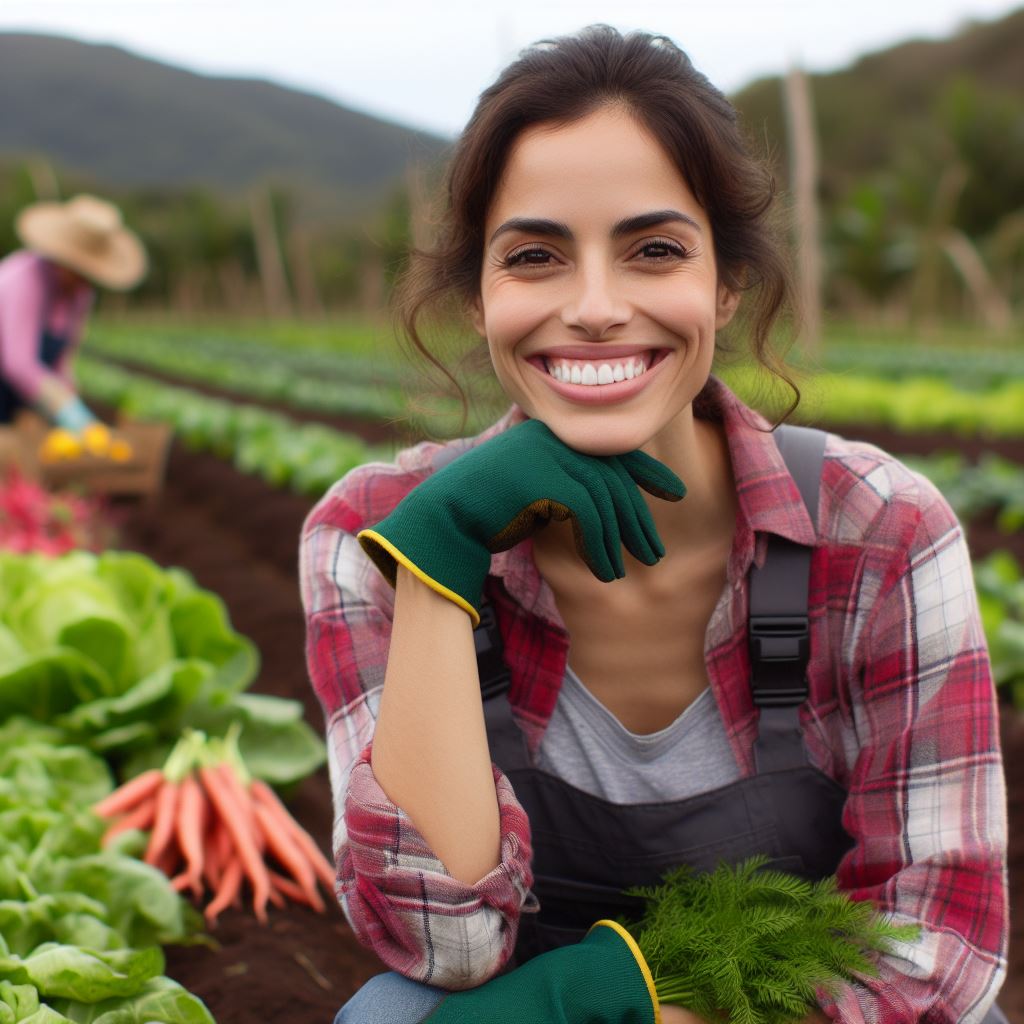
Delve into the Subject: Farm-to-Table Seminars for Beginners
Vertical Farming and Urban Agriculture
A. Olivia’s Belief in the Potential of Vertical Farming
Olivia firmly believes that vertical farming holds immense potential in revolutionizing the future of agriculture.
She envisions a world where tall skyscrapers are not just concrete structures but instead, they transform into lush green spaces.
Vertical farming, according to Olivia, presents a sustainable and innovative solution to address various challenges faced by traditional farming methods.
B. Benefits of Vertical Farming
- One significant advantage of vertical farming is its ability to significantly increase food production.
- By utilizing technology and innovative farming techniques, vertical farms can produce multiple crop cycles in a year.
- This increased efficiency ensures a consistent and abundant supply of fresh produce, reducing dependency on traditional farming methods.
- Moreover, vertical farming requires minimal land space compared to conventional agriculture.
- With the growing population and limited arable land, this aspect becomes crucial in meeting global food demand sustainably.
C. Olivia’s Involvement in Urban Agriculture Projects and Community Gardens
Olivia is actively involved in various urban agriculture projects and community gardens.
She believes that bringing farming closer to urban areas has numerous benefits.
Olivia actively participates in setting up community gardens in vacant city lots, schools, and rooftops.
These initiatives not only promote sustainable food production but also educate and engage local communities in the farming process.
Olivia’s contribution to urban agriculture projects extends beyond physical involvement.
She frequently organizes workshops and awareness campaigns to inspire others to embrace urban farming practices.
D. Contribution to Food Security and Sustainability
- Vertical farming and urban agriculture play a crucial role in ensuring food security and sustainability.
- With climate change and resource depletion, the conventional food supply chain faces uncertainties.
- Vertical farming’s controlled environment enables year-round production, minimizing the impact of climate fluctuations.
- Additionally, urban agriculture reduces the dependency on long-distance transportation, reducing carbon footprints.
- The decentralized nature of urban agriculture also enhances food security by reducing vulnerability to supply chain disruptions.
- Furthermore, community gardens in urban areas can provide affordable, fresh produce to low-income communities.
- By promoting self-sufficiency and reducing reliance on external sources, vertical farming, and urban agriculture contribute to a more sustainable future.
In fact, Olivia firmly believes in the potential of vertical farming and its ability to revolutionize agriculture.
She actively participates in urban agriculture projects, emphasizing the importance of bringing farming closer to urban areas.
Vertical farming offers benefits like increased food production, reduced land usage, and improved sustainability.
Furthermore, it contributes to food security by minimizing climate risks and decentralized supply chains.
Olivia’s vision and involvement in vertical farming and urban agriculture pave the way for a more sustainable and secure future.
Read: Explore Farm-to-Table: Local Seminars
Collaboration and Education
A. Olivia’s Advocacy for Collaboration and Knowledge Sharing Among Farmers
Olivia strongly believes in the power of collaboration and knowledge sharing among farmers.
She understands that by working together, farmers can overcome challenges, innovate, and improve farming practices collectively.
Collaboration is the key to building a stronger and more sustainable agricultural community.
To promote collaboration, Olivia actively encourages farmers to participate in various forums, conferences, and workshops.
She believes that these events provide tremendous opportunities for farmers to connect with each other, share experiences, and learn from each other’s successes and failures.
Through these collaborations, farmers can develop a deeper understanding of the agricultural landscape while fostering a supportive community.
B. Olivia’s Involvement in Farmer’s Networks and Organizations
Olivia is an active member of numerous farmer’s networks and organizations dedicated to promoting collaboration in the agricultural industry.
She understands that by being part of these networks, she can contribute to the collective knowledge and expertise available to farmers worldwide.
Olivia regularly attends meetings and conferences organized by these networks, where she actively participates in discussions and offers her insights.
By engaging with fellow farmers and industry experts, Olivia widens her perspective and stays updated on the latest trends, technologies, and innovative farming methods.
She values the opportunity to exchange ideas, seek advice, and contribute to the development of the farming community.
C. Olivia’s Educational Initiatives to Teach Sustainable Farming Practices
In addition to her collaboration efforts, Olivia is deeply committed to education and creating awareness about sustainable farming practices.
She firmly believes that education is the cornerstone of driving positive change in the agricultural sector.
Olivia organizes workshops and training programs to educate aspiring farmers and existing farmers on sustainable farming techniques.
These initiatives cover topics such as organic farming, agroforestry, soil management, and water conservation.
By imparting knowledge and practical skills, Olivia aims to equip farmers with the tools they need to adopt environmentally friendly and economically viable farming practices.
Through her educational initiatives, Olivia strives to empower farmers to make informed decisions and implement sustainable solutions on their farms.
She believes that education plays a crucial role in shaping the future of farming and ensuring the long-term viability of the agricultural industry.
D. The Importance of Inspiring Future Generations to Pursue Careers in Farming
- Olivia recognizes that inspiring and encouraging future generations to pursue careers in farming is essential for the industry’s sustainability.
- While the younger generation may be drawn to other professions, Olivia aims to change the perception and show the immense potential and fulfilling nature of a career in farming.
- Olivia regularly visits schools and universities to educate students about the importance of agriculture and the various career opportunities available.
- She shares her own experiences and success stories, highlighting the potential for innovation, entrepreneurship, and societal impact within the agricultural sector.
- By inspiring young minds to consider farming as a viable and rewarding career choice, Olivia hopes to attract fresh talent and foster a new generation of passionate farmers.
- She firmly believes that by nurturing this interest in agriculture, we can ensure a prosperous and sustainable future for farming.
In short, Olivia’s advocacy for collaboration, involvement in farmer’s networks and organizations, educational initiatives, and efforts to inspire future generations all contribute to her remarkable vision for the future of farming.
Through collaboration and education, Olivia aims to empower farmers with the knowledge, skills, and mindset necessary to build a sustainable and thriving agricultural community.
By working together and inspiring the next generation, Olivia believes that we can create a future where farming is respected, innovative, and capable of feeding the world while preserving the environment.
Read: Eco-Friendly Eating: 2024’s Best Events
Gain More Insights: Your Guide to Urban Farming Events
Conclusion
Olivia’s vision reshapes farming’s future. She integrates tech, emphasizing efficiency and sustainability.
Showcase Your Farming Business
Publish your professional farming services profile on our blog for a one-time fee of $200 and reach a dedicated audience of farmers and agribusiness owners.
Publish Your ProfilePrecision agriculture, drones, data analytics, and AI elevate her farm, setting a transformative example.
Olivia’s approach signals a shift toward sustainable farming practices. This isn’t just about her farm; it’s a potential revolution.
The impact of her innovations extends beyond her fields, influencing the entire agricultural landscape.
Olivia’s success underscores the need for continuous innovation.
Farming demands collaboration, a collective commitment to evolving practices.
The future hinges on embracing change, pushing boundaries, and cultivating a united front for sustainable agriculture.
Olivia’s journey isn’t just a story—it’s a call to action. Let’s collectively forge a future where innovation and collaboration redefine the very essence of farming.

